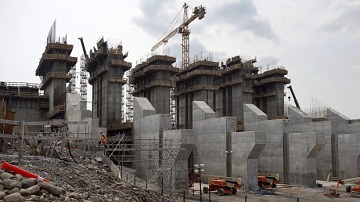 Tuesday, September 24, 2024
Tuesday, September 24, 2024  Tuesday, September 24, 2024
Tuesday, September 24, 2024 
As reported on CTV News, the $12.7-billion Muskrat Falls hydroelectric dam in Labrador is finally nearing completion, billions of dollars over budget and years behind schedule.
But as the public is offered a final say at inquiry hearings Tuesday night in St. John’s and Aug. 8 in Happy Valley-Goose Bay, the province is still answering for a missed deadline on work intended to lessen the impact of methylmercury pollution on crucial food sources for downstream communities.
Advertise YOUR business on Construction Links Network – Download the media kit
The Newfoundland and Labrador government’s slow response to concerns over methylmercury is the latest in a string of disappointments for those who have been calling for action on the issue for years.
“It’s not only a slap in the face, it makes you feel unwelcome in your own home,” Roberta Benefiel said of the missed deadline from Happy Valley-Goose Bay last week.
Benefiel has represented the group Grand Riverkeeper Labrador at a provincial inquiry into the dam’s cost and schedule overruns. She’s one of many Labradorians who resent that the massive hydro dam on the Lower Churchill River, planned by political leaders hundreds of kilometres away, could restrict residents’ access to food.
Methylmercury forms as vegetation rots underwater. Research has indicated that flooding the uncleared reservoir near the dam, scheduled to be complete by the fall, could cause an increase in levels of methylmercury in wild food sources used by local Indigenous communities.
After revealing in June that his government had missed a deadline for “capping” to mitigate the effects of methylmercury after flooding, Liberal Premier Dwight Ball announced on July 23 that the $30 million set aside for the work would instead be paid out to three Indigenous governments in Labrador to improve “social and health benefits.”
Capping involves covering vegetation and soil with a thick layer of material such as sandy clay to prevent the release of carbon that could contribute to a spike in methylmercury levels.